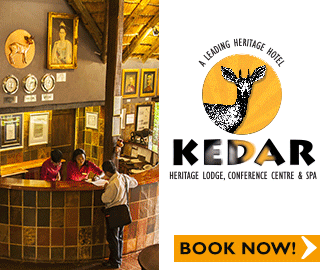
An Attempt To Be A Tourist In Gabon
BY PETER SULLIVAN 16TH NOV, 2014 10:00
Venturing to Gabon's interior I saw more Giant Kingfishers in an hour than I had seen in my entire 64-year-old life. Africa’s biggest rainforest is awesome, getting there is worth the considerable effort as you will discover so much about the country, its people and its potential.
Venturing to Gabon's interior I saw more Giant Kingfishers in an hour than I had seen in my entire 64-year-old life. Africa’s biggest rainforest is awesome, getting there is worth the considerable effort as you will discover so much about the country, its people and its potential.Birdlife is special and prolific. On the estuary in the Louango National Park, hundreds of Darters flew with our small boat on the mighty Ongoue River, deep into Gabon's famed forest.It takes six hours by small speedboat from Port Gentil, itself a small harbour town 45 minutes by air from Libreville, to get to a tiny 5-hut camp in Akaka.Akaka is where you are alone in the middle of the rainforest. Awesome.
Although the only guest in the entire park, I was provided with three helpers: a chef/fire maker, a boatman/bird guide and a house/bar maid. But I run ahead...It was my first visit to Gabon. First impression on arrival is the country is green, humid, has a musty smell, is very French and is extremely fascinating.Big, smart, new, expensive cars in slow traffic along a lengthy boulevard next to the sea take you from the small airport to beachfront hotels in Libreville. Mmm, this country looks rich, you think.It is when you leave the city that you become aware of the chasm between the haves and have-nots. And you discover the fancy SUVs are owned by the rich, but mainly by NGOs, oil companies and government employees.With only 1.5 million people, the biggest rainforest in Africa and a lot of oil, Gabon has great potential.Ah, that word. It captures our hopes and desires, our potential. At school teachers harp on about unfulfilled potential, as do Gabon's friendliest critics.Tourism. Technology. Transport. Telecoms. All need work.
I woke up my first morning to a grey and greasy ocean, the eastern Atlantic, with a tepid humid wind blowing across the beachfront.People are warm, friendly and cheerful, yet seem reluctant to do anything. Almost helpless, which of course they are not. Trying to organise a tour to the fabled reserves in the rainforest was trying, to say the least.Tour companies are thin on the ground. Help is not at hand. Prices can be high, at 320 euros a night in Louango for instance and 100 euros for dinner bed and breakfast at the only hotel in Olako, a small town where most residents still live in shacks. The hotel would struggle to earn three stars. But you can bargain on everything in Gabon, from nights in the park to the price of a soda.That said, the rainforest itself is certainly that overused word, awesome. It inspires awe. It defies description - talk about one huge, tall straight tree and it is immediately out of its jungle context, yet describe the forest itself and you miss the beauty of each tree. You can’t describe the wood for the trees. The extent, too, is vast.
In 2002, President Ali Bongo declared 11 percent of the oil-rich country a protected area, a decision with enormous consequences.A decade later the implementation of that decision is creating work for many, from bureaucrats to conservationists and forest police to scientists.All agree Gabon is not yet ready for real tourism, but it has a detailed plan to be ready by 2015.That plan is frank about obstacles, which include:A lack of qualified personnel in all areas, especially hospitality, accommodation and guiding An infinite number of competing tourism projects Nature tourism is largely Anglophone, yet the country speaks only French Individualism is badly viewed in villages and entrepreneurs or ‘tall poppies’ are cut down to sizeTourism is a complex activity involving many different parties. Patience, money, effort and professionalism are absent.
The chain of command is weak; economic viability is precarious, service needs improvement, marketing must be better and public education about tourism is desperately neededGabon needs close links between government, community, industry, scientific and conservation partners. Those criticisms or suggestions are all in the plan, so there is no lack of awareness.Heading up Gabon’s parks is Professor Lee White, a strong supporter of the president and a realist about where the country currently is. White says Gabon is just not set up for tourism ... yet. "We have a plan and we're getting there. But infrastructure and tourism skills are not there yet. It will take a while."There is a big vision for industrial Gabon to help the economy, but we need to take into account that Gabon is also 88% rainforest and 20% protected areas (this figure differs to the 11% mentioned above)."Other countries create parks in their cities - we have created cities in a park.Our challenge is to plan on expanding Libreville with an emerald necklace around it of protected areas."I'm lucky, I probably work for the greenest president on the planet. Some of our neighbours are less green so we do have cross-border problems."
Getting to my first park was certainly an experience in what still needs to be done. To give readers an idea of travelling in this water world of rainforest, I left the hotel in Libreville at 05.30 in a taxi to the airport, took a 40 minute flight to Port Gentil, then a taxi to the fish market in Port Gentil. There I waited for an hour or two, was on a speedboat for three hours, changed to a long boat, then had a two hour’s car drive and arrived at 15:30 - ten hours later. Even so, you are only at the park's entrance.Getting to Louanga National Park is not easy. And I was lucky I ran into a concession owner at the fish market, who just happened to be going to the park. Asking directions to the speedboat on Port Gentil's oil quay I met Peter Bond, a friendly fellow who invited me to stay next time I was in town. He took me for coffee and a croissant while we waited for the 09:00 boat to take us up the river to Omboue to be ready, which left late at 10:30. Before we embarked, both my Gabonese fellow travellers inquired politely, and independently, whether I knew that Jesus was my saviour.
I considered myself fortunate to know the answer.Wide-eyed at my first look at the forest I vocally enjoyed the boat trip, which was just a commute for them. Everyone travels on water in that area, with roads being few and far between.After a night at the lodge, the next morning my carefully arranged 07:00 boat was only ready at 09: to take me from the outskirts of the rainforest into its heart, for the heart of Louango is Akaka; another three-hour boat ride. It was a fascinating one on a lagoon, into floodplains and flanked on all sides by massive rain forest trees, papyrus, palms, undergrowth and other various vegetation. Ever deeper into the rain forest, wild animals emerge and the birdlife becomes more prolific. Akaka is wild; a tiny camp built facing one of the innumerable rivers, estuaries and lagoons. There are only five tents there and no electricity.
Two forest elephants lifted their trunks to sniff us as we arrived. I ticked my first ever Hartlaub's Duck, then a beautiful Shining Blue Kingfisher and a Slender-snouted crocodile, looking very unthreatening with his long, thin jaw.Akaka's tented huts are sparse and clean, each with a shower and toilet. My three-person team cooked food that was French and superb, ather anachronistically given the jungle setting. A communal kitchen-cum- dining room overlooks the water - a Pelican was swimming right in front to greet us and a Malachite Kingfisher buzzed our boat.
En route to Akaka common birds on the river included scores of Palmnut Vultures, Green-backed Herons, Hammerkops and various species of Kingfishers: Pied, Giant and Shining Blue. We counted 76 Jacana in an hour and over two days, saw eight African Finfoot, a bird rarely seen in South Africa. (It looks like a duck and swims like a duck, but it isn’t a duck!)At night the rainforest is filled with sound: big sounds, little ones, loud and soft, most new to my ears. In the dark of the forest I tried to tell the frogs' calls from the birds. Or were those weird sounds perhaps insects, monkeys or bush babies? Wonderful and exciting. It is truly Africa's Eden.
Unlike many African parks, the forest elephants of Louango are solitary or in pairs – there are no herds. It was curious to see one with great long brown coloured tusks struggle through the muddy bank, each foot audibly sucked by mud as it was withdrawn with difficulty before the beast plunged ever onward through even more mud.A buffalo also tried running from us, quite comically, with its legs in mud up to its under belly.As you drift quietly along the estuary, dense forest keeps opening up to large plains, still with water everywhere and brilliant green ground cover. In one single view at such an opening I saw a flock of 31 Pelicans, a pair of elephants, Great and Cattle Egrets, a hovering Pied Kingfisher, three African Darters, a flock of about 40 White-faced Whistling ducks and a Nile Crocodile observing it all from the bank while two buffalo struggled through the mud.
We stopped floating down the estuary soon after, tied up the boat and took a walk through the forest for an hour, believing mistakenly that we were going ‘to the sea’ whereas we were just going ‘to see’. English is a problem in Gabon, although the President is committed to changing the national language from French to English. We saw three different kinds of monkeys and two species of buck, an ordinary duiker and the Sitatunga, a large and striking antelope much like a kudu.Some very special hornbills haunt the trees, including the big Black-casqued Wattled Hornbill and the Piping Hornbill (“Peeping Hornbill”, my guide kept chanting). We saw a huge Great Blue Turaco and about 40 African Skimmers on a sandbank with a dozen Royal Terns plus a few White Fronted Plovers.
Near Louango Lodge two hippo in the lagoon eyed us warily from about 200 metres away where they were bathing in the sea.But it's not just about the birds or the trees, elephants, crocodiles, buffaloes or the like. It is the whole magnificent rainforest that inspires wonder. .Preservation with eco-tourism will always be a tough battle.
At least Gabon has a plan, a very good place to start.President Ali Bongo and the good Professor White deserve the conservation world's support in their admirable endeavours.















